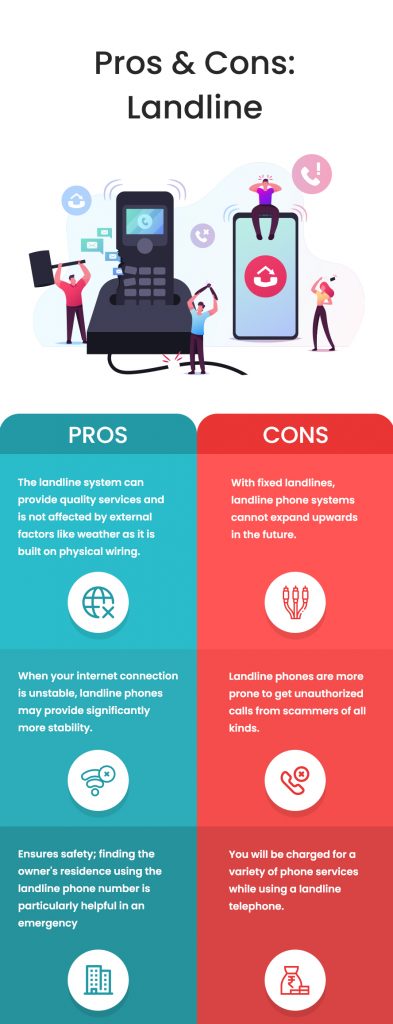Step into the world of business communications, where VoIP and traditional landline phone systems are battling it out.
This debate isn’t just happening in big corporate offices; it’s also in the buzzing environments of startups.
Imagine it like a showdown—a tech-savvy newcomer named VoIP, taking on the reliable but traditional veteran called landline.
From an outsiders’ business perspective and considering today’s business scene, choosing between these two is super important and not an easy walk.
In this blog, we delve into the key distinctions between VoIP systems and landline systems, providing insights to help you distinguish which technology aligns best with your unique business needs.
Join us on a journey through the changing world of communication tech to figure out which, between VoIP and landline, is the right path for your business’s future.
What is VoIP?

VoIP, or Voice over Internet Protocol, is a technology that allows you to make voice calls using the internet rather than a traditional phone line. It converts your voice into digital data and sends it over the internet to the person you’re calling, where it’s converted back into audio.
Think of it like sending an email, but instead of typing a message, you’re speaking into a microphone. Just as emails can be sent instantly worldwide, VoIP enables you to make calls anywhere there’s an internet connection.
For example, if you’ve ever used services like Skype, WhatsApp calls, or Zoom, you’ve already experienced VoIP in action. These applications use the internet to transmit your voice during calls, showcasing the convenience and flexibility that VoIP technology brings to modern communication.
What is a Landline?

A landline is a traditional telephone system that uses physical wires or cables to transmit voice signals. Unlike VoIP, which relies on the internet, a landline phone connects to a network through dedicated telephone lines.
Imagine a landline like an old-fashioned telephone with a cord. When you make a call, your voice is carried through copper wires to the recipient’s phone.
Landline phones are connected to a local exchange, and calls are transmitted through a public switched telephone network (PSTN).
For instance, the classic telephone you might have at home or in an office, where you plug it into a wall jack, is a landline phone. It’s a more established technology compared to VoIP and has been the primary method of voice communication for many decades.
How Does VoIP Differ From a Landline?

VoIP (Voice over Internet Protocol) and landline phone systems differ fundamentally in their technology and infrastructure.
1. Transmission Method:
- VoIP: Utilizes the internet to transmit voice data in digital form. Your voice is converted into data packets and sent over the internet to the recipient.
- Landline: Relies on traditional copper wires or fiber-optic cables to transmit analog signals. Voice signals travel through a dedicated telephone network.
2. Infrastructure:
- VoIP: Requires an internet connection. It’s flexible and can be used on computers, smartphones, or special VoIP phones.
- Landline: Requires physical infrastructure with lines connected to each phone. Landline phones are stationary and connected to a wall jack.
3. Cost:
- VoIP: Often more cost-effective, especially for long-distance or international calls, as it uses existing internet infrastructure.
- Landline: Can be more expensive, particularly for long-distance calls, and may involve additional charges.
4. Mobility:
- VoIP: Offers mobility, allowing users to make calls from anywhere with an internet connection, enhancing flexibility.
- Landline: Generally limited to a specific location due to the physical connection to a wall jack.
5. Features:
- VoIP: Typically comes with advanced features like video conferencing, voicemail to email, and virtual numbers.
- Landline: Offers basic features such as call waiting and voicemail, with fewer advanced options.
6. Reliability:
- VoIP: Reliability can be affected by internet outages or power disruptions, although backup solutions can be implemented.
- Landline: Historically known for high reliability, as it is not dependent on internet connectivity.
Choosing between VoIP and a landline depends on factors like your business needs, budget, and preferred features. While VoIP is gaining popularity for its flexibility and cost-effectiveness, landlines continue to provide a reliable and familiar option for many businesses.
What Are the Benefits of Switching from Landlines to VoIP Services?

The transition from landlines to VoIP offers a comprehensive set of benefits, spanning cost-efficiency, enhanced features, scalability, and adaptability to modern business dynamics.
These advantages position VoIP as a robust and forward-looking communication solution for businesses of all sizes.
Here’s a clear look on why transitioning from Landlines to VoIP is a must for your business.
1. Cost Savings
VoIP operates over the internet, minimizing the need for traditional phone lines and their associated costs. Long-distance and international calls often incur lower charges with VoIP, translating into significant savings for businesses, especially those with frequent international communications.
2. Flexibility and Mobility
VoIP liberates users from physical phone connections, allowing calls to be made and received from virtually any location with an internet connection. This flexibility is especially advantageous for businesses with remote workers, fostering a more dynamic and adaptable work environment.
3. Advanced Features
VoIP systems offer a rich array of advanced features, transforming communication beyond basic voice calls. Video conferencing, voicemail to email transcription, call forwarding, and interactive voice response (IVR system) are just a few examples. These features empower businesses to enhance collaboration and streamline communication processes.
4. Scalability
Scaling a VoIP system to accommodate business growth is notably simpler than expanding a traditional landline infrastructure. Businesses can add or remove lines effortlessly, making VoIP an ideal solution for those with fluctuating communication needs.
5. Integration with Other Systems
VoIP seamlessly integrates with various business applications, including customer relationship management (CRM) tools. This integration streamlines workflows, allowing for smoother and more efficient operations across different departments.
6. Geographic Flexibility
VoIP enables businesses to establish a virtual presence in different geographic locations through the use of virtual phone numbers. This capability is valuable for businesses targeting diverse markets or those with distributed teams.
7. Reliability and Redundancy
While concerns about internet outages may arise, VoIP systems can be configured with redundancy measures to ensure continuous communication. With proper setup, VoIP can offer reliability comparable to traditional landlines.
8. Efficient Resource Utilization
VoIP optimizes bandwidth usage, ensuring that internet resources are utilized efficiently. This efficiency contributes to a smoother communication experience, reducing potential bottlenecks in data transmission.
9. Centralized Management
VoIP systems provide centralized management through user-friendly interfaces. This centralized control facilitates easy configuration, monitoring, and management of the entire phone system, simplifying administrative tasks.
10. Environmentally Friendly
VoIP’s reliance on digital technology and reduced need for physical infrastructure aligns with environmentally friendly practices. This results in a lower carbon footprint compared to traditional landlines, appealing to businesses with a focus on sustainability.
Must Read: How Myoperator Helped Tree Craze Foundation Set Up An Ngo Helpline And Maximize Social Impact
Weighing pros and cons: VoIP or Landline for business
Landline:
Traditional landline systems, while having served faithfully for decades, find themselves eclipsed by the myriad advantages of VoIP technology.
The reliability and stable connection that characterized landlines are now overshadowed by the advanced functionalities offered by VoIP.
In terms of cost, landline services prove to be less budget-friendly, especially for businesses engaged in frequent long-distance or international calling.
Furthermore, the lack of advanced features, such as video conferencing and voicemail transcription, leaves landlines trailing behind in meeting the evolving needs of modern communication.
The static nature of landlines, tethered to specific locations and lacking the flexibility of VoIP, is a considerable drawback in a dynamic business landscape.
As businesses increasingly prioritize adaptability, scalability becomes a notable limitation for traditional landlines.
In essence, the traditional charm of landlines is overshadowed by the cost-effectiveness, advanced features, and flexibility that VoIP injects into the realm of business communications.

VoIP:
VoIP emerges as the avant-garde solution for modern businesses, ushering in a plethora of benefits that significantly outshine traditional landline systems.
The cost savings associated with VoIP are particularly noteworthy, offering a more economical alternative for long-distance and international calls.
Beyond cost, the advanced features provided by VoIP, including video conferencing, voicemail to email, and CRM integration, propel communication into a new era of efficiency and collaboration.
The flexibility and mobility afforded by VoIP are indispensable in a world where remote work is increasingly prevalent. Scalability is seamless, allowing businesses to adapt their communication infrastructure effortlessly.
Although VoIP systems have some dependencies on internet stability, the advantages it brings in terms of features, cost-effectiveness, and adaptability make it the undisputed choice for forward-thinking enterprises.

The Conclusion
In the ever-evolving landscape of remote work, an increasing number of individuals are embracing the flexibility of working from home.
While the appeal of a remote setup is undeniable, it comes with its share of challenges, including overwork, diminished productivity, communication gaps, and feelings of isolation.
Amid these challenges, Voice over Internet Protocol (VoIP) technology emerges as a transformative solution, reshaping the remote work experience. VoIP not only addresses persistent issues faced by remote workers but also simplifies and elevates the entire remote work paradigm.
Implementing VoIP for business brings a host of advantages, including enhanced communication, the ability to work seamlessly on the go, stress reduction, increased productivity, and heightened privacy safeguards.
The beauty of VoIP lies not just in its functionality but also in its simplicity of setup.
To integrate VoIP into your business operations, you only need to select a suitable VoIP service, procure a VoIP-capable device, customize the features based on your requirements, and conduct a simple system test to ensure smooth functionality.
Looking for guidance on setting up VoIP for your remote business? Connect with Myoperator, a leading cloud call center solution provider, and embark on a transformative journey.
Take advantage of a free trial today to experience firsthand the benefits that VoIP can bring to your remote work setup.


